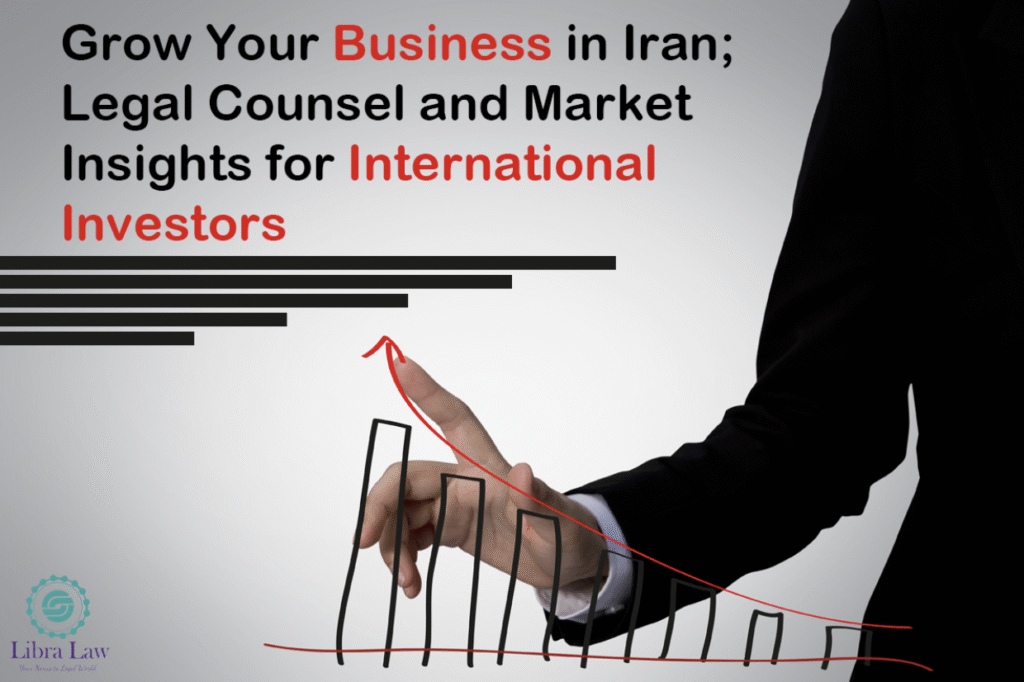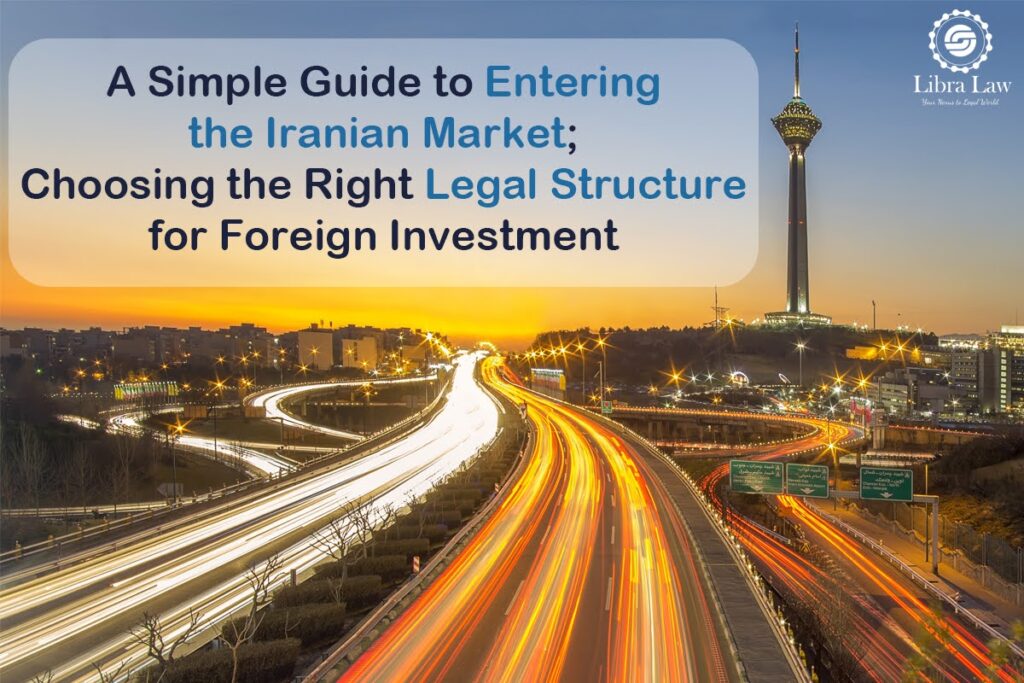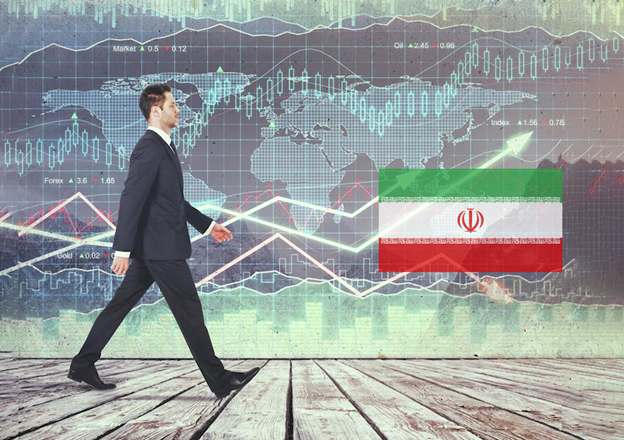As a business owner, understanding the legal landscape is crucial when considering expansion opportunities, particularly in international markets. One of the most vital pieces of legislation for foreign investors in Iran is the Foreign Investment Promotion and Protection Act (FIPPA). Enacted in 2002, FIPPA represents a significant shift in Iran’s approach to foreign investment, modernizing the framework to align with global investment trends. For a broader overview of Iran’s legal and financial investment framework, including how FIPPA fits into it, see our article on «The Complete Legal Guide for Foreign Investors in Iran».
In this article, titled «FIPPA, At a Glance», the legal experts at LibraLaw will explore the key aspects of the Foreign Investment Promotion and Protection Act (FIPPA); They will discuss how this legislation provides a secure and favorable environment for foreign investors in Iran, covering its main provisions, investor protections and the regulatory framework that ensures compliance .This article aims to offer valuable insights for businesses looking to expand into the Iranian market, particularly in the context of international trade and foreign investment.
Brief History of FIPPA
The original foreign investment law in Iran was approved in 1955; This law, along with its implementing regulations, remained in effect even after the 1979 Islamic Revolution. Despite fundamental changes in the political system, the basic legal framework governing foreign capital remained intact, reflecting a degree of legal continuity during an otherwise turbulent period.
Foreign investment in Iran began to gradually re-emerge in 1993, following a long hiatus beginning in 1979; This revival was largely driven by Iran’s post-war reconstruction needs and a broader policy shift toward economic liberalization under President Rafsanjani’s administration. However, despite efforts by the government to open the economy, both the volume and quality of foreign investment remained limited.
Structural barriers in the economy and instability in the broader macroeconomic environment were more influential than political concerns in slowing the pace of foreign investment in Iran. Challenges such as the dominance of state-owned enterprises, weak legal enforcement mechanisms, inconsistent currency policies and a lack of transparency in regulatory frameworks made Iran a particularly difficult environment for foreign investors. While political risk remained an ever-present concern, it often obscured deeper, systemic inefficiencies that ultimately discouraged sustained investment.
Between 1993 and 2002, nearly 140 investment decrees were issued, indicating a slow but increasing willingness on the part of the state to accommodate foreign capital. During this period, German investors ranked first in both the number and value of investment projects, particularly in sectors such as engineering, automotive manufacturing and industrial machinery. Other active investor countries included France, South Korea, the United Kingdom and China—primarily investing in energy, telecommunications and consumer goods.
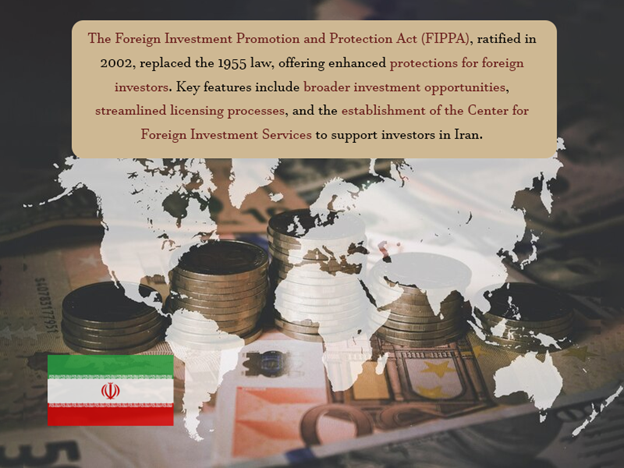
After months of disagreement between the Parliament and the Guardian Council—mainly over the extent of legal protections for foreign investors and the implications for national sovereignty in investor-state dispute settlements—the Expediency Council ratified the final version of a new foreign investment law; This law, titled the Foreign Investment Promotion and Protection Act (FIPPA), was enacted on 26 May 2002. Its implementing regulations were approved later that year, on 15 October 2002.
FIPPA aimed to address the legal and administrative shortcomings of the 1955 law by introducing guarantees against expropriation, simplifying the procedures for the repatriation of capital and profits and allowing for a broader range of investment structures, including Build-Operate-Transfer (BOT) schemes and joint ventures; This legislative reform represented a turning point in Iran’s legal framework for foreign capital, marking a clearer commitment to international legal standards and investor protections.
What Makes FIPPA Essential for Foreign Investors in Iran?
FIPPA plays a crucial role in protecting and fostering foreign investments in Iran. While it doesn’t cover the usual commercial risks associated with investment—such as market volatility or project failure, It significantly mitigates other risks that are more specific to the local investment environment. Below are the key factors that make FIPPA essential for foreign investors in Iran:
- Protection Against Expropriation and Nationalization
One of the core features of FIPPA is its enhanced protection against the expropriation and nationalization of foreign assets. Under FIPPA, any action of expropriation or nationalization by the Iranian government requires compensation; This provision guarantees that foreign investors’ assets will not be arbitrarily seized, offering a sense of security for long-term investments in Iran. In the event of expropriation, the government is legally obligated to compensate investors based on the fair market value of the affected property; This protection significantly reduces the perceived risks of investing in a country where the political environment may be unpredictable.
- Government Compensation for Business Disruptions
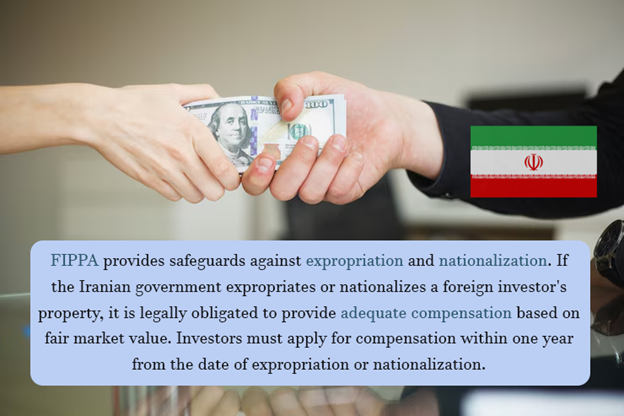
Another important clause within FIPPA addresses the potential disruption of business operations caused by government actions. In cases where government interference hinders the normal functioning of a foreign investment, the government may be required to cover loan installments on behalf of the foreign investor; This provision offers an added layer of financial protection, ensuring that foreign investors are not left struggling to meet their obligations due to circumstances beyond their control. It helps mitigate the risk of default, which could otherwise destabilize a business in a foreign country.
- Broader and Flexible Definition of Foreign Investment
FIPPA’s more inclusive definition of foreign investment significantly broadens the scope of potential investment structures. Unlike earlier laws that were limited to capital inflows, FIPPA encompasses a variety of investment types, such as reinvested profits, imported machinery, technical expertise and intellectual property; This flexibility allows multinational corporations to devise strategic and customized approaches to enter the Iranian market. For example, a foreign telecommunications company might include its software licensing agreement under the FIPPA framework, enabling a more efficient and cohesive approach to business operations in Iran.
- Project Financing Models and Infrastructure Development
FIPPA supports a wider range of financing options, such as Build-Operate-Transfer (BOT) schemes and buy-back agreements; This flexibility is particularly beneficial for large-scale infrastructure projects in sectors like energy, transportation and industrial development. These financing models allow foreign investors to participate in major projects without shouldering the full financial burden from the outset. With the opportunity to recover initial expenditures upon project completion, these models enhance the predictability of returns and provide investors with a clear path to financial recovery.
For an in-depth look at the different legal vehicles available for entering the Iranian market, including joint ventures and other strategic approaches, see our article «A Simple Guide to Entering the Iranian Market; Choosing the Right Legal Structure for Foreign Investment».
- Simplified Profit Repatriation
One of the most critical considerations for foreign investors is the ability to repatriate profits in hard currency. Under previous legal regimes, repatriation was subject to severe restrictions. FIPPA, however, provides investors with greater flexibility, easing concerns about currency convertibility and the overall reliability of the repatriation process; This facilitates smoother international financial transactions and ensures that investors can efficiently move their profits abroad when necessary.
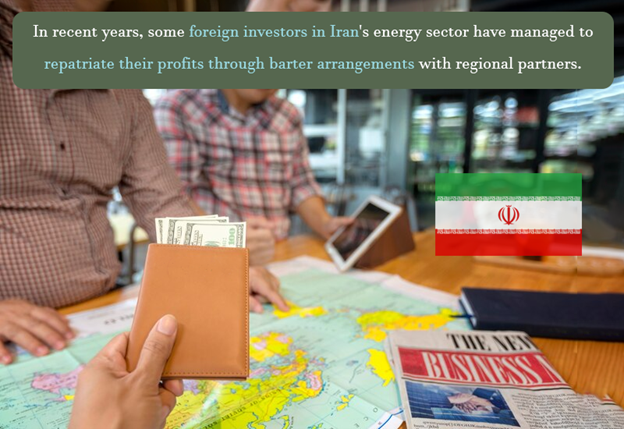
In summary, FIPPA offers foreign investors in Iran an array of protections and advantages that improve legal certainty and reduce financial risks. By providing a more transparent, flexible and secure investment environment, FIPPA makes it easier for foreign companies to establish and sustain operations in Iran’s complex market.
How Does FIPPA Benefit Foreign Investors in Iran?
The Foreign Investment Promotion and Protection Act (FIPPA) was designed to create a favorable environment for foreign investors in Iran by offering a range of legal protections and benefits. While foreign investors are not required to operate under FIPPA, doing so provides significant advantages in terms of legal certainty, administrative efficiency and financial risk mitigation. In a country like Iran, where the investment landscape can be complex and unpredictable, FIPPA acts as a valuable tool to navigate these challenges.
Below are the key benefits that foreign investors can enjoy when they choose to register under FIPPA:
- Structured Legal Framework and Protections
While foreign investors are not required to channel their capital through FIPPA, opting to do so provides a structured legal framework with formal protections; These benefits are crucial in a complex and often uncertain investment environment like Iran. By registering under FIPPA, investors gain clarity regarding their legal rights, protections against unfair treatment and a more predictable investment environment. This legal structure is essential for reducing risks associated with potential legal disputes and financial uncertainties.
- Streamlined Administrative Procedures
One of the key advantages of operating under FIPPA is the simplified administrative process. Foreign investors benefit from expedited approval processes and more transparent mechanisms for resolving disputes; These streamlined procedures save time and reduce the bureaucratic hurdles that often delay investment projects. Investors working outside FIPPA, on the other hand, may face a more complicated and less predictable regulatory environment, which can lead to delays and legal uncertainties. Therefore, FIPPA provides a significant advantage by making the investment process smoother and faster.
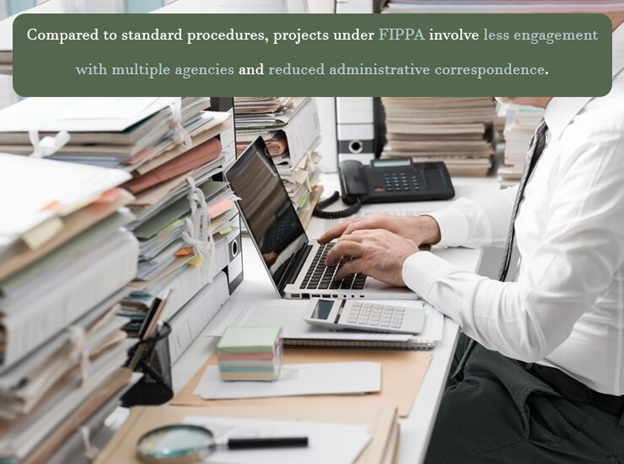
- Flexible Definition of “Foreign Investment”
FIPPA offers a broader and more flexible definition of what constitutes “foreign investment”. In addition to traditional capital inflows, it also includes reinvested profits, imported machinery and equipment, technical expertise and intellectual property; This broad definition allows foreign investors to adopt more creative and strategic approaches when entering the Iranian market. For example, a foreign telecommunications company may register its software licensing agreement as part of a broader investment package under FIPPA—an option that is not typically available under general investment regulations.
- Favorable Foreign Exchange Regulations
Investors who choose to bypass FIPPA are treated the same as domestic investors, which can result in several disadvantages. One of the major disadvantages is the application of strict foreign exchange regulations, which can limit the ability to transfer funds abroad or convert currencies; This can pose significant challenges for foreign investors, particularly in capital-intensive sectors where long-term financial projections and repayment schedules are crucial. By choosing to operate under FIPPA, investors gain access to more flexible and transparent channels for repatriating profits, reducing the risks associated with currency restrictions.
- Access to Large-Scale Infrastructure Projects
Certain large-scale infrastructure projects, especially in sectors like energy and transportation, may require FIPPA approval for formal government cooperation or support. This approval is often essential for gaining access to public-private partnership models or project-level guarantees from local authorities. By not registering under FIPPA, foreign investors may be excluded from these opportunities, limiting their potential to engage in high-value projects. Therefore, FIPPA offers crucial access to these large-scale, government-backed investment opportunities.
- Reduced Legal Uncertainty and Financial Volatility
Finally, while it is possible to invest in Iran without registering under FIPPA, doing so exposes investors to greater legal and financial risks. Operating outside the framework of FIPPA increases the likelihood of legal disputes and financial volatility. For investors seeking long-term stability and success in Iran, FIPPA provides the necessary tools to navigate this challenging environment. It offers predictable procedures, risk mitigation mechanisms and legal protections that can significantly reduce uncertainty and increase the likelihood of a successful investment.
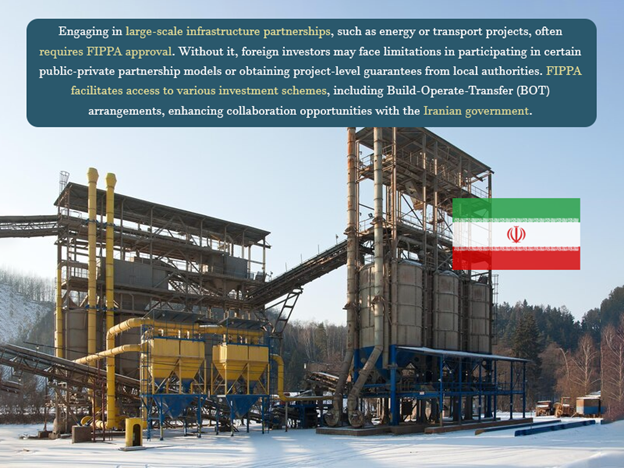
By taking advantage of these benefits, foreign investors can make more informed decisions and create a foundation for sustainable operations in Iran. FIPPA ultimately provides a clear and supportive structure that enhances investment security, reduces risks, and facilitates access to high-potential opportunities.
Understanding the local tax landscape is also critical in managing these risks; read «A Practical Guide to Iranian Tax Laws for Foreign Investors» to explore how taxation laws impact foreign business operations.
Why Should Foreign Companies Consult Legal Experts Before Investing in Iran?
Given the complexity and evolving nature of Iran’s legal and regulatory landscape, it is strongly recommended that foreign companies consult with qualified legal professionals prior to making any commitments or initiating operations in the country. Familiarity with local procedures, sector-specific regulations and the appropriate channels for obtaining governmental approvals is essential for mitigating legal and financial risks.
LibraLaw Lawyers has substantial experience in advising and representing international clients investing in Iran, particularly under the FIPPA framework. Our legal team regularly assists clients in structuring their investments, navigating regulatory challenges and obtaining the necessary authorizations. Interested parties may contact our office via phone or email to arrange an initial consultation and explore how we can support their business ventures in Iran.
For further reading, we recommend our article «Manual for Foreign Investment in Iran», available on the LegaMart weblog; This practical guide provides detailed information for foreign investors, covering key topics ranging from registration procedures to the repatriation of profits.
Given the complexities of investing in Iran and the details surrounding the Foreign Investment Promotion and Protection Act (FIPPA), consulting with specialized lawyers in this field is essential. If you need assistance or advice regarding FIPPA or foreign investments in Iran, the legal experts at LibraLaw, with their expertise and experience in this area, are ready to help. Feel free to contact us for professional guidance and support to ensure your investment is protected and compliant with local regulations.




